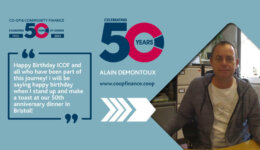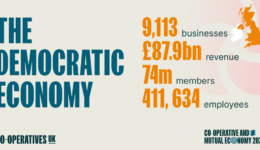Today in our series of interviews looking back at our first fifty years in business, we meet Alain Demontoux who many of you will know. After starting with us as a Trustee in 2002, and joining as staff in 2006, Al is now a key member of the team as our Operations and FCA Compliance Manager
“I first came across ICOF when I was working for Essential Trading. I’d started working there in 1989, packing herbs and picking orders, and then after 16 years was in finance where I was involved in buying the second warehouse. We borrowed £150k from ICOF to fund the equity gap between the purchase price and the Triodos main mortgage. That was in 2001 and that’s when I met Ian Taylor – Ian really liked the reports I was producing and suggested I join the ICOF board. A year or so later I did, and was staff trustee for four years. Then a position came up as Operations Manager, which I interviewed for and that was it!
I joined on condition that we move the main office from London to Bristol, where I lived. The London office was in London Rebuilding Society’s offices, in an old bank on Old Street, and it had a massive vault where we kept all the loan documents. For six weeks I was working out my notice with Essential part time, and then travelling down to London on a Sunday, staying with my sister in Wimbledon, getting the tube to Old Street, doing that backwards and forwards for three days and then getting on the train on Wednesday night to work out my notice at Essential in Bristol on the Thursday and Friday. Exhausting stuff!
Within those six weeks, I moved the office. We found an office with The Ethical Property Company which worked really well and then I had to pack up the old office and put it all back together again in Bristol.
It’s been a journey. In 2008, only two years after I started we had the economic meltdown and banking crisis. We had variable rate loans then with no collars then, so as the interest rates fell, our interest rate income fell through the floor! And now all these years later, it’s a the complete reverse with interest rates flying through the roof. In terms of economic history, we’ve seen the lot!
I came from a worker co-op background. I’ve lived in housing coops, so I was very much from that side of things, and ICOF always seemed to champion that. But you can only champion a market that’s there. Over the years that more traditional style of co-operation has diminished because there hasn’t been the support for coop advisors to keep developing new coops. The Co-op development bodies that were set up in the 80s have dwindled – they were a huge part of our story, our history and our trustees! In fact, some of our seed funding in the 80s was part of that, from the Labour government. If you’re not creating a new raft of co-op development workers to replace all the ones who are now retiring then the sector doesn’t have that support to continue to grow. We’ve adapted what we’re doing, for example by working with community shares. We funded ourselves to the tune of £1.7 million through our PLC share offer in 1987 – that was a ground-breaking ethical investment, right there. Community shares are just an extension of that, getting individuals to get together to raise their own shares, and we’re still doing that through ICOF Community Capital.
Securing funds to on lend has always been something that we have to watch and manage. There’s only so much money we can lend. At one point the Board discussed tripling lending in three years (this was mentioned in Siôn Whellens interview here) and I was tasked to go away and work out the numbers. Well, I calculated we’d run out of money after nine months! Recycling finance is at the core of what we do but that means we need to wait for it to come back in before we can lend it again. I always see lending as fundamentally what we do, and if we weren’t lending – just running a programme – I wouldn’t get the same satisfaction out of the job.
We’ve also been gifted funds by local authorities in the past – local authority co-op loan funds were the flavour of the month for a while, but they soon found that we could run them better which led to them gifting the funds. Whenever someone asks me where the money comes from I always say nice money, from nice people!
Having cash to lend is really important and lending a key part of what we do, but supporting community share offers had become increasingly important. This isn’t just pubs, they can be for cinemas, community centres, bookshops – all kinds of community assets. Some of our relationships, for example with Social Investment Business, Reach Fund and the Co-op Foundation mean we’re able to offer loans and grants, which we’d never been able to do in the old days. The reach we have is much wider now – we can’t just be sitting there with a loan pot for co-ops if that market has changed, we have to change with it whilst retaining influence of the agenda. I’m still heartened that there’s a lot of collectivisation, it doesn’t have to be a worker co-op for people to get together and do stuff for themselves in their communities.
Personally, I’m proud that I’ve had two jobs with two co-ops, with no gaps, in over 30 years – it’s incredible. I sometimes wonder how that happened! It’s been a privilege. I think I’ve been very lucky to have been involved in two organisations that align so completely with my values. Essential has a massive place in my heart and I’m amazed when I look at how big they are now. Being able to transition from them to ICOF has just been an amazing journey really. I’m blessed to still be working in this sector.
Happy birthday ICOF and all who have been part of this journey! I will be saying happy birthday when I stand up and make a toast at our 50th anniversary dinner in Bristol!



